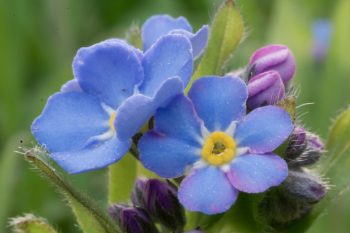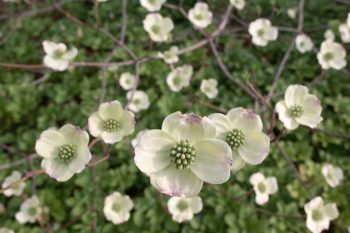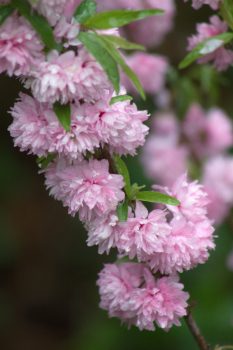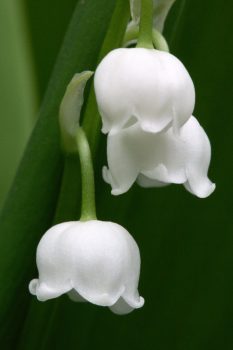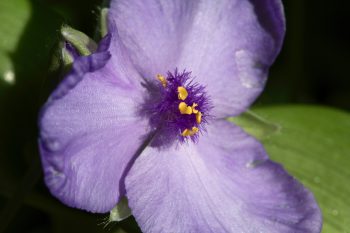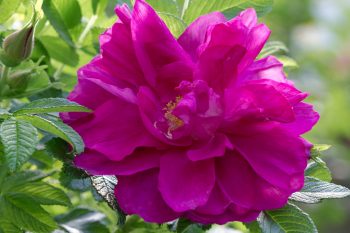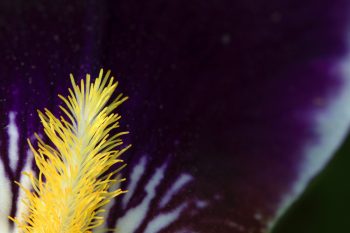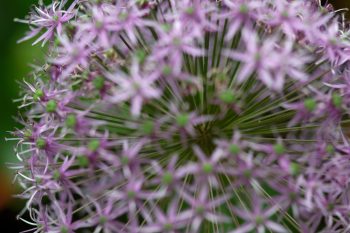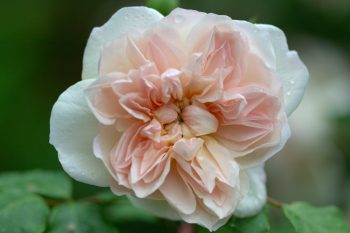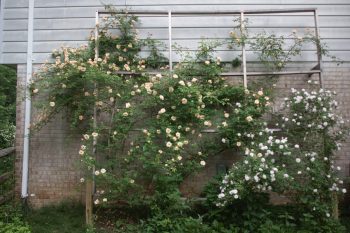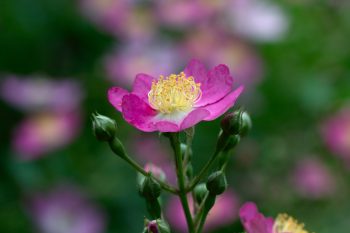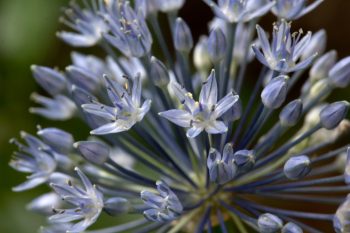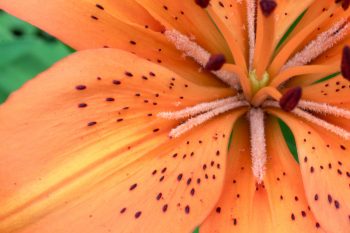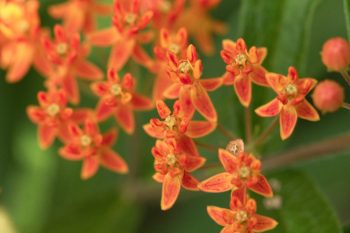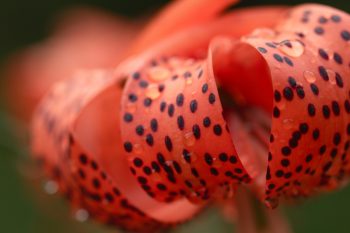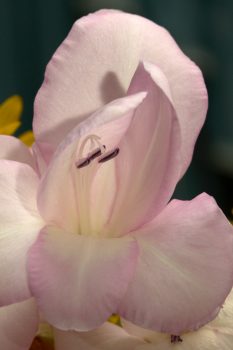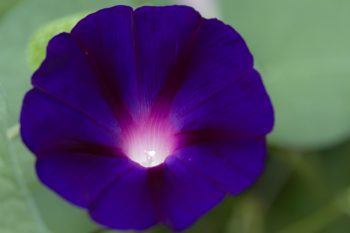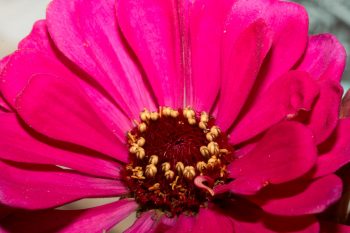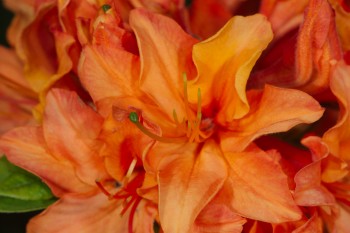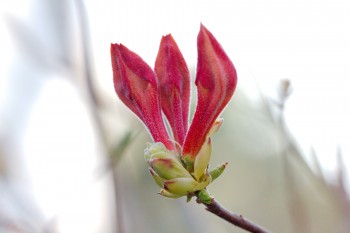Getting close again today after a few days of not. The forget-me-nots are starting to bloom so I’m posting one now before I forget.
Tagged With: Bloom
Forget-Me-Nots
Dogwood Blossoms
I know I’ve already done dogwood flowers but a) I never said I wouldn’t repeat and b) I like this picture. In the Extras gallery there’s a pink dogwood flower, as well.
Flowering Almond
We planted this flowering almond when we first moved into the house. It was given to Cathy by a friend. It never gets more than about three feet tall and dies back almost to the ground every other year. Still, when it’s in bloom, it’s pretty nice. And it doesn’t need any pruning.
Lily of the Valley
I love these little bells. We brought lily of the valley (Convallaria majalis) with us from George Street only to buy a house where there was a significant amount already planted. I’ve seen it forcing its way up through pavement, so it’s quite tenacious once it gets established. I could only wish the flowers lasted longer.
Spiderwort
This is the first bloom on our Tradescantia (spiderwort) out front in the shade garden. This one is lighter purple than most but still quite pretty. I especially like the deep purple stamen hairs and the yellow anthers. Apparently, when the stamen hairs are exposed to ionizing radiation they turn pink. Looks like were safe, for now.
Rose ‘Roseraie De l’Hay’
This is a nice rugosa hybrid that booms all summer long. The flowers have an intense clove scent that I really love. The only downside is that the shrub is so tall and most of the roses are on the top so you usually see them from below. Still, it will have a lot of blooms shortly and will be something to see.
Bearded Iris
The irises are starting to bloom all over. This is a purple and yellow variety outside our dining room window. I think yellow and purple are a terrific color combination.
Fireworks
You know when the really big fireworks explosions go off, they produce lines of light radiating out from the center with smaller explosions at the end of each ray? That’s what this reminds me of. It’s one of the large Alliums (gigantium or cristophii, I’d guess) growing in Ralph and Tsai-Hong’s garden.
‘Jaune Desprez’
I wish you could smell this rose. This is a Noisette rose called ‘Jaune Desprez’ (Desprez, France, 1835). The individual blooms are not the most beautifully shaped in all creation but it blooms reliably and grows pretty vigorously.
Rose Trellis
Last summer Kevin helped me build this rose trellis. The roses haven’t had a chance to fill in completely but it’s starting to look pretty good.
On the right is ‘Champneys’ Pink Cluster’ (Champneys, U.S., 1811). Although it isn’t really a climbing rose the support is helpful, anyway. On the left is ‘Crépuscule’ (Francis Dubreuil, France, 1904). Both of them are Noisette roses and bloom pretty well off and on all summer. ‘Crépuscule’ has the stronger scent but both are nice in that regard.
A Pink Multiflora Rose
Normally I’d be the last person to suggest that anyone grow a multiflora rose. About them the great plantsman Michael Dirr says, “use this species with the knowledge that none of your gardening friends in the immediate vicinity will ever speak to you again.”
Still, when I came across a bright pink multiflora — it is almost certainly a natural hybrid but it is a multiflora in every way except petal color — I decided I had to have it. I dug up a small piece and it’s thriving on my back fence. The parent plant was destroyed, so I got it just in time.
It’s really a lovely shrub and it is absolutely covered with hundreds of flowers and thousands of buds. Just don’t tell Spencer.
Allium caeruleum
This is a sweet little blue allium. I think I’ll get a few more of these this fall.
Asiatic Lily
This is the first of our few (but beautiful) Asiatic lilies to bloom. We really should have more of these.
Butterfly Weed
Turk’s Cap Lily
My dad had these growing in his garden and was spreading them by planting the bulbils that form in the axils of the leaves. After we moved in 2006 Cathy started collecting bulbils and planting them here, as well. They are doing nicely and add a nice splash of color this time of year.
Morning Glory
I rarely give this plant any name but bindweed and I spend a lot of time pulling it out of my garden. I do have to say, though, that for colors in the deepest registers, this is just about as good as it gets. The morning glory (along with the lowly petunia) has some of the most beautiful, deep, rich, colors in the world of flowers.
Exbury Azalea
Cathy called me today from Home Depot asking if I wanted her to buy this Exbury azalea. I’ve been meaning to get a few of these for the yard and this one was reasonably priced and it good shape, so I said yes. What is an Exbury azalea, you might ask? They have a fairly complicated makeup and many of the early records don’t exist. But in the late 18th century, hybrids were made between North American azalea species Rhododendron calendulaceum, nudiflorum, arborescens, and viscosum, and the bright yellow flowered, European R. luteum, producing what are generally referred to as Ghent azaleas. The addition of R. molle and japonicum took the azaleas to the next stage, the Mollis and then R. occidentale was added, giving us the Knaphill azaleas. Starting in the 1920s Lionel de Rothschild made hundreds of thousands of hybrids and brought us the Exbury azalea. Well, that’s a rather simplified history. You can read more here: http://scholar.lib.vt.edu/ejournals/JARS/v40n1/v40n1-cash1.htm.
Exbury Azalea Buds
The Exbury azalea that Cathy bought for me last year is getting ready to bloom. I planted it near the top of our driveway, to the right where there used to be an awful holly shrub. The deer did some damage to it late last summer but what’s left of it is beginning to come to life. The flower and leaf buds are swelling and there should be some blooms in a few days. The Exbury azaleas are among the deciduous azaleas. In fact, most azalea species are deciduous but since most of us are familiar with azaleas through the proliferation of the Glenn Dale cultivars (developed by Benjamin Morrison from 1935 through 1952), which are evergreen. The Exbury hybrids were made in the 1920s by Lionel de Rothschild and their genetic makeup contains some or all of the following: R. arborescens, R. calendulaceum, R. japonicum, R. luteum, R. molle, R. nudiflorum, R. occidentale, and R. viscosum.

